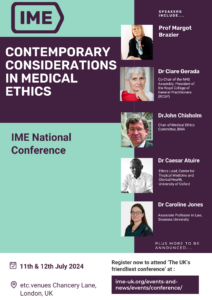Contemporary Considerations in Medical Ethics – 2024 IME National Conference

What are your colleagues thinking about? Worrying about? Creating new evidence in relation to? Where are they focussing their energies? How are they influencing discussion and debate on the key international issues of our time? What can we learn from each other and how can we amplify our voices to create hope and certainty for the future health of our planet?
This conference will bring together lawyers, philosophers, bioethicists and healthcare practitioners in order to reflection on contemporary issues in medical ethics and bioethics. Covering aspects of healthcare that includes the use of Artificial Intelligence, Global Health equity, climate resilience, workforce challenges and the impact of changes in abortion law upon practice, together we will examine the key issues of our time. This year, we are introducing the Ted Shotter Medal and the IME Medal for Moral Impact and will honour Professor Margot Brazier and Dame Clare Gerada for the significant impact they have made in their respective fields.
We hope you will join us for our exciting two-day event, leaving us restored, invigorated and, perhaps, a little further focussed on where we, as a community of ethicists, need to take our influence and endeavours next. All this from ‘the UK’s friendliest conference’ and more…

Confirmed speakers include:
Dr Caesar Atuire: Ethics Lead, Centre for Tropical Medicine and Global Health, University of Oxford
Prof Margot Brazier
Sarah Briggs: NIHR Clinical Lecturer, Centre for Human Genetics, University of Oxford
Dr John Chisholm: Chair of Medical Ethics Committee, BMA
Dr Clare Gerada: Co-Chair of the NHS Assembly, President of the Royal College of General Practitioners (RCGP)
Dr Caroline Jones: Associate Professor in Law, Swansea University
Dr Emily Ottley: Lecturer in Law, University of Winchester
09.15 – 10.00
Registration and Coffee
10.00 -10.10
Conference opening
10.10 – 10.55
Keynote Speaker – Climate resilience in healthcare
Sarah Briggs
10.55 – 11.40
Keynote Speaker – Abortion Law
Emily Ottley
11.40 – 12.05
Coffee and poster viewing
12.05 – 13.05
Parallel Sessions 1A, 1B and 1C [3x15mins with 5mins Q&A] – Please see the Parallel Sessions tab for full detail
13.05 – 14.05
Lunch and poster viewing
14.05 – 15.05
The IME Medal for Moral Impact for pioneering work developing practitioner wellbeing & mental healthcare services Keynote Speaker
Clare Gerada
15.05 – 1525
Coffee and poster viewing
15.25 – 16.05
Parallel Sessions 2A, 2B and 2C [3x15mins with 5mins Q&A] – Please see the Parallel Sessions tab for full detail
16.25 – 17.30
Debate
17.30 – 19.00
Social Gathering and poster viewing
09.00 – 9.15
Registration and Coffee
09.15 – 10.15
Ted Shotter Lifetime Recognition Medal for Endeavour in Medical Ethics Keynote Speaker
Margot Brazier
10.15 – 11.00
Keynote Speaker – Inequity in Global Health
Caesar Atuire
11.00 – 11.25
Coffee and poster viewing
11.25 – 12.25
Parallel Sessions 3A, 3B and 3C [3x15mins with 5mins Q&A] – Please see the Parallel Sessions tab for full detail
12.25 – 13.25
Lunch and poster viewing
13.25 – 14.25
Parallel Sessions 4A, 4B and4C [3x15mins with 5mins Q&A] – Please see the Parallel Sessions tab for full detail
14.25 – 14.45
Coffee and poster viewing
14.45 – 15.30
Keynote Speaker
Caroline Jones
15.30 – 16.15
Keynote Speaker
John Chisholm
16.15 – 16.30
Conference Close
Wing May Kong
The Parallel Sessions have been grouped in to 3 streams to enable delegates to more easily find sessions to meet their interests throughout the conference.
Stream 1 (A Sessions) – Body/Climate/Philosophy/Ethics
Stream 2 (B Sessions) – Children and Young People/Education, practitioner and students/Health Inequalities/Policy/Law
Stream 3 (C Sessions) – Artificial Intelligence/Mental health and well-being/Safeguarding
Thursday 12.05 – 13.05 session
| Session 1A Body/Climate/ Philosophy/Policy |
Session 1B Children/ Education/Health inequalities/Law |
Session 1C AI/MH/safeguarding |
| How can we be sure graduates will do the right things for the right reasons?
Zuzana Deans (Senior Lecturer, Bioethics, Centre for Ethics in Medicine, Bristol Medical School, University of Bristol) |
An evaluation of recent policy developments under NHS England with a particular consideration of children’s best interest
Khadijeh Hamidian Shour Masty (Lecturer in Law, University of Winchester) |
Psychedelics, Psychotherapy and Meaning in Life
Nathan Emmerich (Senior Lecturer, ANU) |
| Doctors and Wisdom Wheel, outcome: ethical decisions
Aisha Y Malik (Associate Tutor, Warwick University) |
Embarking on the Journey: Unravelling the Family’s Role in Medical Decision-making Across Chinese Horizons
Shengyu Zhao (PhD student, University of Bristol) |
Exploring the attribution of responsibility to patients diagnosed with personality disorders
Lauren Glover (Medical Student, University of Birmingham) |
| Healthcare exceptionalism: what is a fair share of the burdens of climate change mitigation for healthcare?
Joshua Parker (PhD Candidate, Lancaster University) |
Thinking fast not slow: consent, cancer and young people
Angela Jesudason (Consultant Paediatric Oncologist, NHS Lothian) |
Is IT therapy?
Rachel Katz (PhD Candidate, University of Toronto) |
Thursday 15.25 – 16.25 session
| Session 2A Body/Climate/ Philosophy/Policy |
Session 2B Children/ Education/Health inequalities/Law |
Session 2C AI/MH/safeguarding |
| Bodily modification – The Inconsistencies within English Law
Mohammed Awyas Nasim (Doctor, NHS – Stockport Foundation Trust) |
Extracting human resources: using H3Africa as a case study to explore genomics research in Africa according to neocolonial and social justice frameworks
Miranda MacFarlane (Research Assistant, King’s College London) |
Safeguarding and AI in healthcare: a call for shifting focus
Matimba Swana (PhD Student, University of Bristol) |
| Exploring the Bioethical Landscape of Emerging Human Reproductive Models and Devices
Amy Hinterberger (Associate Professor and Chair, University of Washington) |
Addressing Health Inequalities Within Healthcare Through the Lens of Intersectionality
Melissa Rajalingam (Medical student, Brighton and Sussex medical school) |
Beyond Boundaries: Navigating Bioethics in the Era of Bionic Advancements
Tommaso Ropelato (PhD candidate, University of Turin) |
|
A Call for Paternalistic Interventions in Online Porn Consumption Joona Räsänen (Senior Researcher, University of Turku) |
The ethical imperative to reduce sex work stigma
Esther Braun (Research associate, Ruhr University Bochum) |
The impact of AI (artificial intelligence) on therapeutic relationships in healthcare. An enquiry
Paquita de Zulueta (Hon Senior Lecturer, Imperial College) |
Friday 11.25 – 12.25 session
| Session 3A Body/Climate/ Philosophy/Policy |
Session 3B Children/ Education/Health inequalities/Law |
Session 3C AI/MH/safeguarding |
| Do the ethical bases of the General Medical Council and the NHS differ?
Russell Foster (Consultant Psychiatrist, King’s College Hospital) |
Bearing Witness and the Ethical Place of the Medical Student
Lily Johnson (Medical Student, University of Manchester) |
Echoes of Ethics: Translating Disability Ethical Considerations from Precision Medicine to Digital Twins
Andrew Barnhart (Postdoctoral Research Fellow, University of Bonn) |
| Reassessing “Good” Medical Practice and the Climate Crisis
Rammina Yassaie (Senior Lecturer in Leadership in Health and Social Care, Sheffield Hallam University) |
Assessing UK Medical Ethics Education: Perspectives and Proficiencies of Near-Graduate Medical Students
David Gringras (5th-year Medical Student, University of Edinburgh Medical School) |
|
| The Implications of Telemedicine for Marginalised Abortion Seekers in England
Sabrina Germain (Reader in Healthcare Law and Policy, City Law School) |
The limitations of case law in driving the development of patients’ autonomy-based rights into medical practice
Caitriona Cox (ACF, University of Cambridge) |
Is it unethical to use SSRIs to treat depression and eating disorders in teenage girls (vulnerable group) given that a common side effect is weight loss?
Sally Alzein (Third year medical student, University of Leeds) |
Friday 13.25 – 14.25 session
| Session 4A Body/Climate/ Philosophy/Policy |
Session 4B Children/ Education/Health inequalities/Law |
Session 4C AI/MH/safeguarding |
| Responsibility-Sensitive Healthcare Policies with or without a Golden Opportunity: (Harmfully) Discriminatory or Not?
Lydia Tsiakiri (PhD Student, Aarhus University) |
Uncovering the extent to which children meaningfully participate in medical law best interest decisions
Rebecca Limb (Lecturer in Law, University of Southampton) |
Use of Artificial Intelligence (AI) Tools in Medical Ethics: Opportunities and Challenges
Evangelina Mollar (Directora Regional de Latinoamerica, BioEthx) |
| If we are both nankvis, how do I know you have the same idea of nankvi-hood as I do?
Sara Dahlen (Student, King’s College London) |
Best Interests and Rotten Compromise: exploring the instrumentalisation of P
Jordan A. Parsons (Assistant Professor in Medical Ethics and Law, University of Birmingham) |
Deep Layers of Dilemma: The Ethical Challenges of AI integration in Dermatology
Sut Mo Zachary Chan (FY1 Foundation Doctor, NHS Scotland) |
| Epistemic corruption: Mr Bates and the NHS
Edwin Jesudason (Consultant in Rehabilitation Medicine, NHS Lothian) |
Is there a way to reconcile the divergent ethical commitments of clinicians working in gender care for children?
Bernadette Wren (Emerita Honorary Consultant Clinical Psychologist, Tavistock and Portman NHS Foundation Trust) |
etc.venues Chancery Lane
50-52 Chancery Ln
London
WC2A 1HL
///reject.other.begins
By underground:
Chancery Lane and Holborn (Central line) and Covent Garden (Piccadilly) are the nearest stations.
Option 1 – Chancery Lane
Leave the station via exit 4 and walk up the steps onto High Holborn. Keep walking up High Holborn (keeping the road on your right) for about 3 minutes. Turn left onto Chancery Lane and walk a further 3 minutes. The venue is on the left just over a road called Southampton Buildings.
Option 2 – Holborn
Leave the station via the High Holborn exit and turn right on to High Holborn. Walk down (keeping the road on your left) past the University of the Arts for 5 minutes. Turn right on to Chancery Lane and walk a further 3 minutes. The venue is on the left just over a road called Southampton Buildings.
Option 3 – Covent Garden
Leave the station and turn left on to Long Acre street, then turn right and follow Long Acre, until you reach Drury Lane. Cross over Drury Lane on to Great Queen Street, and keep walking past The Freemasons Hall. Kingsway will be ahead of you, cross over, turn left and walk towards High Holborn – you will see Holborn Station on the corner. Turn right at the station and follow as option 2.
By Train:
Farringdon Station Thameslink
Exit Farringdon station via the Farringdon Road/Cowcross Street exit and turn left. Walk down the small street to Farringdon Road, cross over and walk up Greville Street. Turn left on to Hatton Garden and cross over the zebra crossing, keep walking until you see a statue of Albert Prince Consort. Here cross over the road and walk up High Holborn for about 8 minutes, Chancery Lane will be on your left just after the underground exit. The venue is on the left just over a road called Southampton Buildings.
By Bus:
Chancery Lane is served by a number of bus routes including, 4, 11, 15, 26, 76, 172, 341.
Parking:
There are many NCP car parks near the venue, the nearest is located on Cross Street (Saffron Hill NCP) with another close by in Covent Garden (Covent Garden, Parker Street).
Wheelchair access: Yes
Wheelchair parking: Yes
Approach to building: Street/pavement
Door control: Fitted door holding devices
Internal corridor width: 1.25 metres
Mobile induction loop: Yes
Accessible WC: Yes
Induction loop installed: Yes
Assistance dog friendly: Yes
Accessible WC: Yes
Lift 1: Height – 200 cm
Doors – 75 cm
Width – 100 cm
Depth – 125 cm
Lift 2: Height – 200 cm
Doors – 75 cm
Width – 100 cm
Depth – 125 cm
Students – £25 for one day/£40 for 2 days
IME members – £50 for one day/£90 for 2 days (In order to get this price please ensure you log in at the top right of the booking page)
Non-members – £90 for one day/£160 for 2 days (IME Membership is only £80 for full membership (£70 for Concessionary members) with a £10 discount available when paying by Direct Debit – sign up here before registering to get the members delegate fee)
Accommodation is not included in the delegate fee. We do not have recommended hotels however there are lots of hotels within walking distance or close to connected underground stations.

